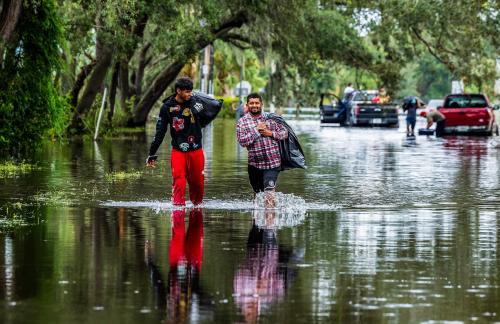Immediately following a disaster, there is a loss of supply in the affected area. After hurricanes, oil spills, or floods, the people, land, buildings, and other resources can no longer supply the same level of output. Power outages can halt production, and in the wake of the Gulf oil rig explosion, oil wells were shut down.
The earthquake and tsunami in Japan destroyed factories and homes, and the loss of auto parts forced shutdowns even in factories in the United States. This loss of output is matched by a loss of income for workers and companies.
The first-round effect of natural disasters, then, is that income and output (GDP) fall. Japan’s GDP loss
from the earthquake is estimated at 0.7 percent to 3.0 percent. Often, however, the quantitative impact of this first round is small, particularly when the disaster happens to a large diversified economy like that of the United States. Following the unnatural disaster of the World Trade Center destruction, there was little sign of an impact on overall U.S. GDP.
What happens in the next round depends on the way the country or region responds to the crisis. Japan is a strong economy and has the resources to start rebuilding quickly. It is expected that Japanese GDP will rebound as production is restored to damaged factories. Japan has pledged to rebuild the destroyed housing and social infrastructure and this increase in government spending will likely boost the economy.
The opposite case is Haiti, which was an extremely poor and badly managed economy prior to the hurricane, and whose weak economic base was severely damaged. Despite a substantial international aid response, Haiti has not recovered.
The impact of Hurricane Katrina on New Orleans lies somewhere in between. Louisiana has much greater resources than Haiti and was able to draw on assistance from the federal government. To some degree, New Orleans has been able to bounce back from the disaster, with tourists returning and the Saints back in the Superdome. However, the population, which is currently 30 percent below its 2000 level, may never fully recover.
In the short term, therefore, disasters have a negative impact on output, income, and employment. Measured by GDP, recovery spending may lead to higher output and employment after a period of time. Even this positive effect, however, is somewhat of an illusion because GDP typically does not account for all the economic losses from the disaster, notably loss of capital.
There is no way that a disaster can be viewed as good news economically, even if GDP is boosted for a few quarters as a result of recovery. And for very poor countries or people, the disaster may scar their economic futures for a long time to come.
The Brookings Institution is committed to quality, independence, and impact.
We are supported by a diverse array of funders. In line with our values and policies, each Brookings publication represents the sole views of its author(s).



Commentary
Op-edCan Natural Disasters Help Stimulate the Economy?
September 1, 2011